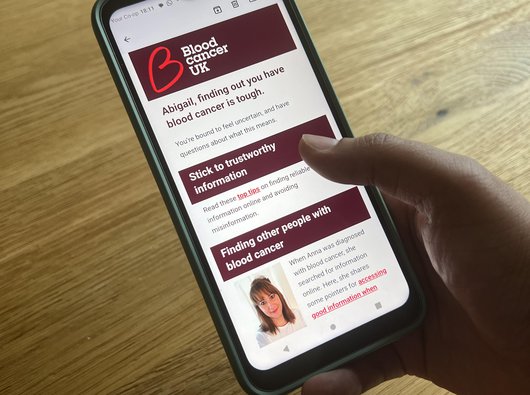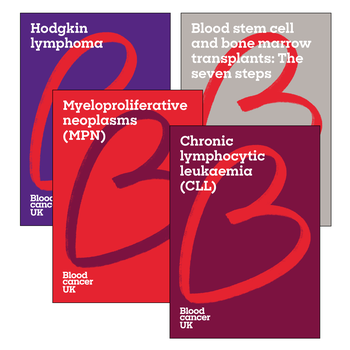
About blood cancer
Blood cancer is a term that's used to describe many different types of cancer that can affect your blood, bone marrow or lymphatic system. It happens when something goes wrong with the development of your blood cells.
Blood cancer is a type of cancer that affects your blood cells. Leukaemia, lymphoma and myeloma are some of the most common types of blood cancer. There are also types called MPNs and MDS.
Blood cancer is caused by changes (mutations) in the DNA within blood cells. This causes the blood cells to start behaving abnormally. In almost all cases, these changes are linked to things we can’t control. They happen during a person’s lifetime, so they are not genetic faults you can pass on.
Some types of blood cancer affect children. Symptoms and treatment can be different between children and adults.
Around 40,000 people are diagnosed with a blood cancer each year in the UK, and about 280,000 people are currently living with blood cancer.
There are different types of blood cancer, including leukaemia, lymphoma, myeloma, myelodysplastic syndromes (MDS) and myeloproliferative neoplasms (MPN). They each have different symptoms, treatments and prognoses. (Prognosis is the medical term for what's likely to happen in the future.)
If you're diagnosed you'll be told more about the specific type of blood cancer you have. For example, types of lymphoma include Hodgkin lymphoma and non-Hodgkin lymphoma. Types of leukaemia include chronic lymphocytic leukaemia (CLL) and acute myeloid leukaemia (AML).
Blood cancers are sometimes described as acute or chronic. Acute means fast-growing and chronic means slower growing.
Although we don’t normally know exactly why someone will develop blood cancer, there are things that we know can affect your risk:
- age
- sex
- ethnicity
- family history
- radiation or chemical exposure
- some health conditions and treatments.
How these factors affect risk depends on the type of blood cancer.
People with blood cancer may experience a range of symptoms, including:
- weight loss that's unexplained
- bruising or bleeding that's unexplained
- lumps or swellings
- shortness of breath (breathlessness)
- drenching night sweats
- infections that are persistent, recurrent or severe
- fever (37.5°C or above) that is unexplained
- rash or itchy skin that's unexplained
- pain in your bones, joints or abdomen (stomach area)
- tiredness that doesn’t improve with rest or sleep (fatigue)
- paleness (pallor) – if you gently pull down the lower eyelid, the skin inside looks white or pale pink instead of dark pink or red.
Find out more about blood cancer symptoms.
If your doctor suspects you have blood cancer, they'll run a series of tests to help them diagnose you.
If you've just been told you have blood cancer
Sign up to our weekly support email for people recently diagnosed.
It gives you clear and simple information, practical tips and advice from others with blood cancer, to help during the first few weeks and months after diagnosis.

Blood cancer treatment
There's a range of different treatments for blood cancer. You might have one type of treatment or a number of them, depending on the type of blood cancer you have. Common blood cancer treatments include:
- chemotherapy
- targeted therapies
- immunotherapy
- radiotherapy
- stem cell transplants.
If you have a slow-growing blood cancer, you may not need treatment straight away, and some people never need it. This is called being on watch and wait.
Blood cancer treatments can have side effects. Some people experience some of these effects as a result of the cancer itself, even if they aren't having treatment.
If someone you love has been diagnosed
You might find our information for family and friends helpful. It covers:
- how to support someone with blood cancer
- practical tips
- coping with your own emotions
- real stories from other friends and family members.
You can also listen to our Blood Cancer Heart to Heart podcast where people share what it's like to have a loved one diagnosed with blood cancer.
After you’ve been diagnosed with blood cancer, you may want to know more about your prognosis − what's likely to happen in the future.
It’s best to ask your medical team about your prognosis, if you want to know about it at all. Your individual prognosis will depend on a number of things:
- your diagnosis, including the type of blood cancer and the results of specific tests
- the stage of the disease when you’re diagnosed
- your age and general fitness.
Even taking these things into account, the information your medical team gives you will be quite general. It will be based on what’s happened to people similar to you, but people can still have quite different experiences.
Over the last 60 years we've funded £500m of research. Now, we want to beat blood cancer in a generation.
Blood Cancer UK was started in 1960 by the Eastwoods, whose daughter Susan died just weeks after being diagnosed with blood cancer. Susan’s parents wanted to stop others from having to go through what they had, so they started raising money to fund research into finding a cure.
When Susan was diagnosed in 1960, only one child in ten survived the type of leukaemia she had. Today, thanks to research, that figure is nine in ten.
We believe that if we continue funding research at the same pace as we have over the last 60 years, 30 years from now, everyone will survive blood cancer.
We have information about coping with blood cancer for teenagers and young adults aged 16 to 25.
It's a guide to treatment, side effects, your emotions, friendships and working or studying with blood cancer. Watch young people share their experiences and tips on how to get through it. And find out what you need to know about being young and having blood cancer.
Clinical Trials
All new drugs and treatments are thoroughly tested before they’re made available to patients. Following tests in a laboratory, they’re tested on people. Research studies involving testing new drugs and treatments on people are called clinical trials.
Find out more about clinical trials.

Living well
Practical tips and real stories to help you with everyday life.
Throughout 2022-2024, Blood Cancer UK has been transforming its health information. This project was made possible by generous funding from partners, trusts and foundations including Roche, Jazz Pharmaceuticals Incyte, AstraZeneca, AbbVie, Sobi UK, The Garfield Weston Foundation, The Steel Charitable Trust and The Grace Trust. These organisations provided funding but had no further input.



